
Appearance
before the Standing Committee on Access
to
Information, Privacy and Ethics
April 29, 2008


Statement
Recommendations
Recommendation Number 1
Recommendation Number 2
Recommendation Number 3
Recommendation Number 4
Recommendation Number 5
Recommendation Number 6
Recommendation Number 7
Recommendation Number 8
Recommendation Number 9
Recommendation Number 10
Reforming the Privacy Act – A Chronology of Recommendations

Proposed
Immediate Changes to the Privacy Act
Appearance
before the Standing Committee on Access to Information, Privacy and Ethics
April 29, 2008
Statement by
Jennifer Stoddart
Privacy Commissioner of Canada
(Check against
delivery)
Introduction
Thank you, Mr. Chairman and members of the Committee, for inviting me to address you
once again on the issue of Privacy Act reform. I’m joined by Raymond
D’Aoust, Assistant Commissioner for the Privacy Act, and Patricia Kosseim, our General Counsel.
In 2006, as you may recall, my Office tabled with the Committee a comprehensive
document entitled Government Accountability for Personal Information:
Reforming the Privacy Act. More recently, for the purposes of our April 17 appearance,
we prepared an Addendum to that document, discussing how events of the past two
years illustrate the ongoing need for reform of the Act. At that time, I
provided you with a list of ten recommended changes to the Privacy Act.
These changes were outlined in my opening statement to the Committee.
Further to a request from the Committee, my Office has now prepared a third document,
which provides greater detail on the rationale supporting our ten “quick fix”
recommendations.
I would like to make it clear that the changes we are currently proposing are not
meant to be the definitive statement on Privacy Act reform. This is
most emphatically not the case – the Privacy Act is in desperate need of
a full Parliamentary review and complete overhaul.
I realize, however, that a full Parliamentary review of the Act may not happen
for some time. While we wait for a comprehensive modernization initiative,
there are some relatively simple changes we could make which would be of
significant benefit to Canadians.
Some of the changes we are suggesting would simply incorporate into law existing
Treasury Board Secretariat policies and practices. Other recommendations
correspond to privacy requirements found in PIPEDA – Canada’s private sector privacy law.
“Quick Fix” Recommendations
I’d like to provide a quick overview of the ten recommendations:
-
Parliament should create a requirement in the Privacy Act for government
departments to demonstrate the need for collecting personal information. This
“necessity test” is already included in Treasury Board policies as well as PIPEDA.
It is an internationally recognized privacy principle found in modern privacy
legislation around the world.
-
The role of the Federal Court should be broadened to allow it to review all grounds
under the Privacy Act, not just denial of access.
-
Parliament should enshrine into law the obligation of Deputy Heads to carry out a Privacy
Impact Assessment – or PIA – before a new program or policy is implemented.
-
The Privacy Act should be amended to provide my Office with a clear public education
mandate. PIPEDA contains such a mandate and it is only logical that the Privacy Act
contain a similar mandate for the public sector.
-
The Act should be further amended to provide my Office with increased flexibility
to publicly report on the privacy management practices of the federal
government. As it now stands, we are limited to reporting to Parliament and
Canadians through annual or special reports.
-
My Office should have greater discretion to refuse or discontinue complaints if an
investigation would serve no useful purpose or is not in the public interest.
This would allow us to focus investigative resources on privacy complaints
which are of broad systemic interest and affect the interests of a significant
number of Canadians.
-
The Act should be aligned with PIPEDA by eliminating the restriction that
the Privacy Act applies only to “recorded” information. At the moment,
for example, personal information contained in DNA and other biological samples
is not explicitly covered.
-
Annual reporting requirements of government departments and agencies under section 72
of the Act could be strengthened by requiring these institutions to report to
Parliament on a wider spectrum of privacy-related activities.
-
The Act should include a provision requiring an ongoing five-year Parliamentary
review of the Privacy Act, as is the case with PIPEDA.
-
The Act should be strengthened with respect to the provisions governing the disclosure of
personal information by the Canadian government to foreign states. Treasury
Board Secretariat (TBS) has taken some important steps by providing guidance on
information sharing agreements and outsourcing of personal data processing.
However, we need privacy protections related to cross-border information
sharing enshrined into law.
Privacy Education in the Public Service
Our Office also believes more needs to be done to ensure that program managers in the
public services are aware of their responsibilities under the Privacy Act and related TBS guidelines.
I urge the Government to carry out a comprehensive assessment of the privacy
training provided to public servants. It is critical that privacy issues are
thoroughly addressed in leadership, professional development and management
courses aimed at all levels of the public service.
Conclusion
In closing I would like to re-emphasize that although we are proposing ten “quick
fix” changes, the Privacy Act is still very much in need of a major
review and overhaul. There are many other problems with the Act that require
attention, including the need for proper security safeguards for personal
information and mandatory breach notification. This said, however, making the
adjustments to the Act that we are suggesting would certainly help to enhance
the level of personal information protection in the federal public sector.
Thank you for inviting me to share some further thoughts on this important subject.
We would be pleased to answer any questions.

Recommendation Number 1: Create a
legislative “necessity test” which would require government institutions to
demonstrate the need for the personal information they collect.
Recommendation Number 2: Broaden the
grounds for which an application for Court review under section 41 of the Privacy
Act may be made to include the full array of privacy rights and protections
under the Privacy Act and give the Federal Court the power to award
damages against offending institutions.
Recommendation Number 3: Enshrine
a requirement for heads of government institutions subject to the Privacy
Act to assess the privacy impact of programs or systems prior to their
implementation and to publicly report assessment results.
Recommendation Number 4: Amend the Privacy
Act to provide the Office of the Privacy Commissioner of Canada with a clear public education mandate.
Recommendation Number 5: Provide
greater discretion for the Office of the Privacy Commissioner of Canada to report publicly on the privacy
management practices of government institutions.
Recommendation Number 6: Provide
discretion for the Privacy Commissioner to refuse and/or discontinue complaints
the investigation of which would serve little or no useful purpose, and would
not be in the public interest to pursue.
Recommendation Number 7: Amend the Privacy
Act to align it with the Personal Information Protection and Electronic
Documents Act by eliminating the restriction that the Privacy Act applies to
recorded information only.
Recommendation Number 8: Strengthen the
annual reporting requirements of government departments and agencies under
section 72 of the Privacy Act, by requiring these institutions to report
to Parliament on a broader spectrum of privacy-related activities.
Recommendation Number 9: Introduction
of a provision requiring an ongoing five year Parliamentary review of the Privacy
Act.
Recommendation Number 10: Strengthen the
provisions governing the disclosure of personal information by the Canadian government
to foreign states.

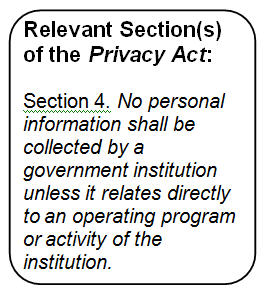
Create a legislative
“necessity test” which would require government institutions to demonstrate the
need for the personal information they collect.
Background:
A far more effective expression of privacy rights, typical of modern data protection
laws, is to require that the collection of information be reasonable and
necessary for the program or activity. This standard has been adopted in other
legislation both in Canada and abroad. Treasury Board policy states that there
must be a demonstrable need for each piece of personal information collected in
order to carry out the program or activity. Principle 4.4 of the Personal
Information Protection and Electronic Documents Act (“PIPEDA”) requires
the collection to be limited to that which is necessary for the purposes
identified. The standard set in section 12 of the CSIS Act limits
information collection “to the extent that it is strictly necessary” to that
institution’s mandate.
Almost all provinces and the territories have adopted a model in the public sector
legislation that requires that one of three conditions be met: (i) the
collection is expressly authorized by statute; (ii) the information is
collected for the purpose of law enforcement; or (iii) the information relates
directly to and is necessary for an operating program or activity.
Consideration should also be given to including a requirement that the government institution
must collect personal information in the least intrusive and most transparent
manner possible, to address technologies which are inherently privacy-invasive
such as video surveillance, GPS, biometrics, etc.
Rationale:
Giving Effect to the Fundamental Right to Privacy
The Supreme Court of Canada has recognized on numerous occasions that privacy
interests are worthy of protection under the Charter[1] and that the Privacy
Act has quasi-constitutional status.[2] The current wording of section 4 of the Privacy Act sets a
disproportionately low standard for the fundamental rights at the heart of the Privacy
Act. By building in better controls at the collection point, there is less
potential for misusing and disclosing personal information.
Providing Stronger Legislative Controls around the
Collection of Personal Information
The public reaction to HRDC’s Longitudinal Labour Force File provides a graphic
reminder of the need to provide better legislative controls around the
collection of personal information. The Office of the Privacy Commissioner
(the “OPC”) reported on this matter in its 1999-2000 Annual Report. The
department had assembled an extensive database for research purposes containing
personal information on millions of individuals. While the department argued
that it was in compliance with the literal collection standard set by the Privacy
Act, the OPC did not accept that all of the information contained in that
database was directly relevant and necessary to HRDC’s operating programs and
policy activities. Since then, the database has been dismantled and the
department has been steadily improving in its privacy management practices.
In another of its recommendations, the OPC urges that the Privacy Act be
broadened to permit an individual to seek court review for all aspects of
personal information collection, use and disclosure. An appropriate collection
standard, combined with a right of court review, would be an important first
step in creating a more meaningful legal framework.

Broaden the grounds for which an application for Court
review under section 41 of the Privacy Act may be made to include the
full array of privacy rights and protections under the Privacy Act and
give the Federal Court the power to award damages against offending
institutions.
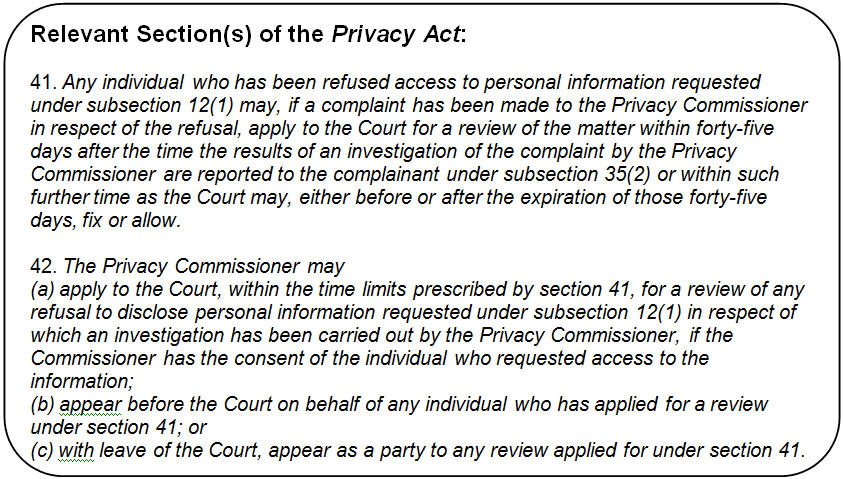
Background:
Under section 41 of the Privacy Act, the Federal Court may only review
a refusal by a government institution to grant access to personal information
requested by an individual under section 12 of the Privacy Act. Although
the Commissioner can investigate complaints concerning the full array of rights
and protections under the Privacy Act and make recommendations to the
government institution, if the response of the institution is not satisfactory,
neither the individual nor the Privacy Commissioner has the possibility to
apply to the Federal Court for enforcement and remedy.
The inability of the Privacy Act to provide effective remedies for
violations of privacy rights was confirmed by the Federal Court in Murdoch
v. Canada (Royal Canadian Mounted Police), [2005] 4 F.C.R. 340. In
that case, the RCMP wrongfully disclosed personal information regarding Mr.
Murdoch to his employer. The OPC concluded that Mr. Murdoch’s complaint was
well-founded, and he tried to seek a Court remedy. However, the Court
concluded that, as it is currently structured, the Privacy Act did not
give Mr. Murdoch the right to seek a remedy for the breach of his privacy.
Furthermore, the Court noted that the power of the Federal Court to grant a
remedy is effectively restricted to granting access to personal information.
Rationale:
Giving Effect to the Fundamental and Quasi-Constitutional
Status of Privacy Rights
Broadening Federal Court review would confirm that privacy rights in the public sector and
the private sector are equally important, ensure that government institutions
respect every Canadian’s right to have their personal information collected,
used and disclosed in accordance with the Privacy Act and give full
weight to the privacy rights of individuals in a free and democratic society.
The Supreme Court of Canada has confirmed that the purpose of the Privacy
Act is to protect the privacy of individuals with respect to personal
information about themselves held by a government institution, this purpose
being of such importance to warrant characterizing the Privacy Act as
“quasi-constitutional” because of the role privacy plays in the preservation of
a free and democratic society. [3]
Keeping Government Accountability Through a Meaningful
Review Mechanism
Implementing our recommendation would give Canadians the same rights regarding their
personal information collected, used or disclosed by their own government
institutions that they hold vis-à-vis private-sector organizations exercising
commercial activities under PIPEDA. Government institutions
should be even more open and accountable with respect to their personal
information handling practices, and increasing government accountability
clearly requires strengthened privacy rights when it comes to how government
handles the personal information of Canadians. Our recommendation is essential
to achieving meaningful government accountability and transparency.
Directly Protecting Privacy Rights Through the Intended
Legislation
The Supreme Court of Canada has held that a third-party to an access to information
request made under the ATI Act can apply to the Federal Court for a
hearing in respect of a government institution’s disclosure of personal
information.[4]
Given that the Supreme Court of Canada has held that the right to privacy is paramount over
the right of access to information, how can it be that a third-party can
appear before the Federal Court with respect to the disclosure of another
person’s personal information under the ATI Act, but that an individual
cannot even seek enforcement and a remedy for a violation of the fundamental
right of privacy under the Privacy Act vis-à-vis his or her own personal
information? Broadening Federal Court review under the Privacy Act would
address this unintended consequence.
There is No Right Without a Remedy
Every right needs a remedy in order to have meaning. This is especially so with
respect to a fundamental right such as privacy. Implementing our
recommendation would ensure that the Federal Court can review the full array of
fundamental rights and protections under the Privacy Act, including
inappropriate collection, use or disclosure of personal information, failure to
maintain up-to-date and accurate data, improper retention or disposal, and
denials of access or correction by government institutions. It would also
ensure that the Federal Court may award damages in cases where, for example,
the inappropriate use or disclosure of personal information causes
embarrassment or other harms to the individual concerned.
The Need for Court Guidance
Implementing our recommendation would allow the Federal Court to provide needed guidance on
what constitutes inappropriate collection, use or disclosure of personal
information.
 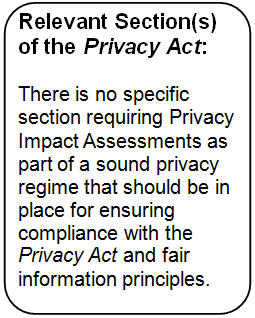
Enshrine a requirement for heads of government institutions
subject to the Privacy Act to assess the privacy impact of programs or
systems prior to their implementation and to publicly report assessment
results.
Background:
In May 2002, the Treasury Board Secretariat (the “TBS”) introduced an
administrative policy on Privacy Impact Assessments. The policy was adopted to
assure Canadians that privacy principles would be taken into account when there
are proposals for programs and services that raise privacy issues, throughout
the design, implementation and evolution of those initiatives. This represents
a core component of a privacy compliant regime since the policy requires that
institutions demonstrate that their collection, use and disclosure of personal
information respect the Privacy Act.
Rationale:
Given the unevenness with which government institutions are implementing the Privacy
Impact Assessment policy, there should be a legal requirement for Privacy
Impact Assessments to ensure that they are done on a consistent and timely
basis.
Ensuring Compliance with the Privacy Impact Assessment
Policy
In the OPC’s 2007 audit of government compliance with the Privacy Impact
Assessment policy, it was ascertained that institutions are not fully meeting their
commitments under the policy. Privacy Impact Assessments are not always
conducted when they should be. They are frequently completed well after program
implementation, or not at all. Present PIA reporting and notification standards
provide little assurance or information to Canadians seeking to understand the
privacy implications of government services or programs.
Furthermore, the Policy in and of itself does not provide assurance that privacy impacts are
being assessed for pervasive and strategic government-wide initiatives.
Knowing the potential privacy impacts of proposed policies and plans would
provide government (TBS and/or Cabinet) with an early opportunity to modify
programs or systems to protect the personal information of individuals in Canada, and perhaps
reduce future costs associated with program or system changes.
Strengthening Accountability
Privacy Impact Assessments should be submitted to the OPC for review prior to program
implementation. Review by the OPC provides independent and objective
recommendations as to how privacy could be better protected while meeting
program objectives in less intrusive ways.
Ensuring the Transparency of Government Programs
Privacy Impact Assessments are vitally important and should be a key element of a
privacy management framework enshrined in legislation. Canadians should be
assured in law that privacy risks will be identified and mitigated as an
integral part of administering federal government programs. To this end,
institutions should be required to publicly report assessment results. In
making the privacy implications of programs more transparent, Canadians will
have an opportunity to voice their concerns and will have assurance that
privacy risks are being addressed.
 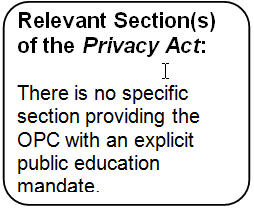
Amend the Privacy Act to provide the OPC with a clear
public education mandate.
Background:
While PIPEDA provides the OPC with a public education mandate, the Privacy
Act does not do so explicitly. Section 24 of PIPEDA states that
“the Commissioner shall: (a) develop and conduct information programs to foster
public understanding…; (b) undertake and publish research that is related to
the protection of personal information, including any such research that is
requested by the Minister of Industry; (c) encourage organizations to develop
detailed policies and practices, including organizational codes of practice…;
and (d) promote, by any means that the Commissioner considers appropriate, the
purposes of this Part.”
Rationale:
While the OPC’s central function under the Privacy Act is the investigation
and resolution of complaints, the OPC also needs to advance privacy rights by
other means – through research, communication and public education. The
Commissioner lacks the legislative mandate under the Privacy Act to
educate the public about their informational privacy rights with respect to
information held by federal government institutions. The Commissioner should
be equally empowered to sensitize business, government and the public under the Privacy Act.
Case Summaries on Public Sector Personal Information
Management
Currently, the main vehicle for reporting on cases is the Annual Report under the Privacy
Act. However, with a more explicit public education mandate and more
flexible means for public reporting, the OPC could publish a compendium of
significant cases that fall under the Privacy Act, notably in the areas
of national security, law enforcement, and health. Several civil society
groups with an interest in privacy promotion have urged the OPC to make more
timely public reports on the state of governmental surveillance activities and
how these activities may impact on privacy.
Periodic Assessments of Departmental Privacy Performance
The OPC wishes to foster a more informed public debate of the federal government’s
role in areas involving the sharing of personal information between agencies
and jurisdictions. A clear public education authority would allow the OPC to
publish public advisories and education material on significant policy and
legislative measures with “personal information” components.
Support the Learning Objectives of Informational Rights
Professionals
Surveys carried out by Treasury Board Canada indicate there are significant learning
needs on the part of Access to Information and Privacy (ATIP) professionals,
pointing to the increased number and complexity of cases, as well as to the
number of new organizations being covered by the Privacy Act as a result
of the adoption of the Federal Accountability Act. The surveys also
reveal—corroborated by the OPC’s own audit and review work—that learning needs
are not being addressed by the current learning infrastructure. By making more
information available in a more timely way, the OPC will become a valuable
source of information on the need for a more consistent approach to privacy
management across the federal government.
Broader Parameters for the OPC’s Research Program
Better research into public sector personal information management is needed to inform
public policy. Section 24 of PIPEDA allows the OPC to undertake and
publish research that is related to the protection of personal information in
the private sector, with a specific funding envelope. Under this education
mandate, the OPC has put in place a comprehensive Research Contributions Program
which has allocated over $1,000,000 to more than 30 privacy research
initiatives in Canada, resulting in extensive studies on key privacy issues.
These research papers are publicly available on the OPC website. A similar
mandate should exist under the Privacy Act for research relating to
public sector matters.
Benefits the Citizens and Residents of Canada
A clearer public education mandate for the OPC would allow for more extensive and
better informed public dialogue on federal privacy management in areas of
critical importance to the right to privacy. It would also ensure a more
consistent approach to privacy compliance by addressing the learning needs of
informational rights professionals.
 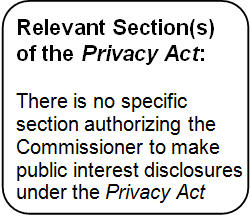
Provide greater discretion for the OPC to disclose
information in the public interest on the privacy management practices of
government institutions.
Background:
Pursuant to the Federal Accountability Act, the OPC is now subject to both the ATI
Act and the Privacy Act. As a result, there is now a public right
of access under the ATI Act to certain information contained in OPC
investigation files, and an individual right of access to personal information
in such files under the Privacy Act. The right of access arises only
once the OPC has completed its investigation, thus respecting the need to
maintain confidentiality of ongoing investigations.
No changes were made by the Federal Accountability Act to the provisions in
the Privacy Act that govern the Commissioner’s authority to initiate a
public release of its investigation activities and findings. As a result, the
only clear legislative vehicles available to the OPC for public reporting
purposes are the annual and special reporting provisions.
Rationale:
Serving the Public Interest and Meeting Public
Expectations
It would be consistent with the recent amendments to the ATI Act and Privacy
Act granting a right of access to information in OPC investigation files,
to permit the OPC to release information on its own initiative concerning the
personal information management practices of a government institution where
this serves the public interest.
There is a public expectation that the OPC will investigate and report on matters of
public interest. This is particularly so where the privacy issue is already in
the public domain. The OPC has been hampered in its ability to speak with the
press, with the public, and even with Members of Parliament, due to the
existing confidentiality constraints in the Privacy Act. Furthermore, a
public interest disclosure discretion would allow for more timely and relevant
disclosure rather than having to wait until the end of the reporting year when
the information may have become moot, stale or largely irrelevant.
Educating Canadians
Strengthening the ability to report publicly is an integral component of a strong public
education mandate. Under PIPEDA, the legislated public education
mandate is accompanied by the discretion to disclose information concerning the
personal information management practices of an organization if the
Commissioner considers that it is in the public interest to do so.
Upholding Public Confidence
The discretion to report publicly under PIPEDA has been an invaluable tool for the
OPC in advancing public understanding, providing public assurances, and
restoring public confidence where required. The discretion to make a public
interest disclosure has been used responsibly and judiciously by the OPC, after
due consideration of the various interests at play.

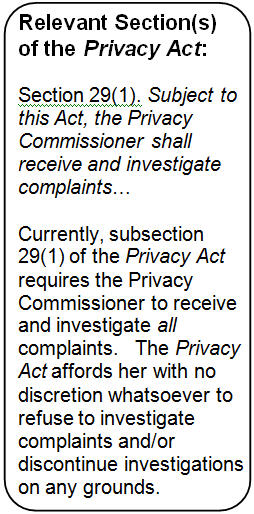
Provide discretion for the Privacy Commissioner to refuse and/or
discontinue complaints the investigation of which would serve little or no
useful purpose, and would not be in the public interest to pursue.
Background:
At the time the OPC requested and received additional funding in 2006, it was the hope that the
generous influx of new resources would enable the Office to reduce the lengthy
and persistent delays associated with having to investigate all individual complaints
that come in the door, while at the same time, focus efforts towards the more
systemic and pervasive privacy threats facing modern society as a whole.
Despite the progress the OPC has made to date, and notwithstanding plans to
take these efforts to the next level, valuable Office resources are
still being disproportionately consumed by having to open and investigate all
individual complaints on a first-come first-serve basis. The waste of public
resources is particularly taxing in cases where the complaints appear to have
no merit, the central issue is clearly not privacy but some different dispute
between the parties, the Office’s intervention would serve no useful purpose
and/or a full-scale investigation into the matter would not be in the public interest.
As concrete examples of some of the kinds of complaints the OPC receives, relatively little
is gained by investigating and/or re-investigating:
-
repetitive issues that come up and have already been clearly decided in past cases (e.g.
legitimate collection and use of Social Insurance Numbers);
-
moot time complaints where the individual has since received the information
requested (e.g. where access was already provided, though technically out of
time and at no disadvantage to the individual);
-
frequent complaints brought forward by the same individual who has an obvious “axe to
grind” against an government institution (e.g. where contentious labour or
employment issues constitute the real dispute between the parties which could
be more effectively dealt with through other, more appropriate procedures);
-
multiple complaints brought by many individuals in respect of the same incident (e.g. a
data breach involving personal information of many individuals which is already
well documented and need not be re-investigated only to confirm what is already
known);
-
issues that have already been recognized and addressed by the government institution
(e.g. effective remedial action has already been taken).
Rationale:
More Effective Use of Limited Resources
Greater discretion at the front end of the intake function would enable the
Commissioner to concentrate her limited available resources on complaints that
raise systemic issues and have broader, more significant impact on the state of
personal information management across the Federal Government.
Traditionally, privacy issues have come up through the individual complaint system as a result
of discrete informational transactions between individuals and their
governments. Today, major privacy issues arise from more systemic threats
resulting from the encroachment of national security and law enforcement
initiatives, multiple trans-border data flows, sophisticated data-mining and
data-matching programs, and rapidly-advancing information technologies,
particularly those enabled by the internet. Such new and emerging threats
affect society as a whole, on such a daily and pervasive level, and in such
complex and non-transparent fashion, that in most cases, the average person
would not even know about them, let alone complain about them.
Data protection authorities around the world recognize that they must increasingly direct their
efforts at curbing these massive threats at their source, as these emerge,
rather than wait for an individual to bring a complaint about them and deal
with them as they make their way up the long queue. Many data protection
authorities in Canada and elsewhere face similar challenges in having to treat
all complaints received indiscriminately, with no ability to dismiss or
discontinue some of them early on where no public interest would be served by
investigating or continuing to investigate them. We are all concerned about
the cost of carrying out investigations that amount to no useful purpose and
the corresponding opportunity cost of not dealing more effectively with
the growing number of broad and systemic issues that are far more pervasive and
pose much greater threat to privacy rights.
Focussing Investigative Resources on Privacy Issues that
are of Broader Public Interest
The UK Commissioner recently asked the British Parliament for the right to investigate only
when an issue is in the public interest. In like manner, the US Federal
Trade Commission (the “FTC”) does not accept complaints from individuals but uses
them to track systemic issues warranting FTC intervention. Here in
Canada, the Canadian Human Rights Act, the Public Servants Disclosure Protection
Act and the Accountability Act as well as the Quebec Private
Sector Act allow those Commissioners to
refuse or cease to examine a matter if the application is frivolous, made in
bad faith, could be better dealt with in another forum or where further
investigation would clearly serve no purpose.[5] In
November 2007, the Alberta Select Special Review Committee recommended that Alberta’s Personal
Information Protection Act be amended “to provide
the Commissioner with explicit authority to discontinue an investigation
or a review when the Commissioner believes the complaint or request for review
is without merit or where there is not sufficient evidence to proceed.”[6] More recently, the
British Columbia Special Review Committee recommended an identical amendment to
B.C.’s Personal Information Protection Act, as well as a further
clarification “that the Commissioner has the discretion not to proceed with an
inquiry in certain circumstances and the authority to reasonably determine his
own process.”[7]
The OPC requests that the Committee recommend granting similar discretion for the Commissioner:
one which gives the Commissioner greater discretion at the front-end to refuse
complaints and/or close complaints early if their investigation would serve no
useful purpose, thereby allowing the Office to focus its investigative
resources on privacy issues that are of broader public interest. The
OPC has asked the government that it be given the same discretion under PIPEDA and
it makes sense that both Acts should mirror each other in this respect.

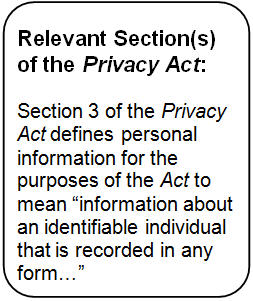
Amend the Privacy Act to align it with PIPEDA by eliminating the restriction that the Privacy Act applies to recorded
information only.
Background:
The definition of personal information under the Privacy Act is limited to
information that exists in recorded form. At the moment, personal information
contained in DNA and other biological samples is not explicitly covered. This
is not the case in the PIPEDA legislation – in which the definition of
personal information includes personal information in any form. New health
sector privacy laws in Canada also define personal information to include
unrecorded personal information. This broader, more modernized definition
serves as a means to protect the privacy rights of Canadians in a changing,
technology-driven world.
Rationale:
Having the Privacy Act Reflect Modern Realities
The Privacy Act’s current definition of personal information is outdated.
Unrecorded information, such as from surveillance cameras that monitor, but do
not record, individuals at border crossings and the comings and goings of
government workers is beyond the scope of the Privacy Act. In
an ever-shrinking world, it is important that individuals are free to go about
their daily activities anonymously. With the onset of rapid technological
changes, governments are using increasingly sophisticated means to monitor
Canadians in the work place and on the streets.
Likewise, personal information such as DNA and other human tissue samples are not covered.
This use of unrecorded information can yield intelligible information about
identifiable individuals. As such, it should have legal protection.
Harmonizing the Definition of Personal Information
Modern privacy laws such as PIPEDA and provincial private
sector privacy laws apply to both recorded and unrecorded information. For
example, a security company in the Northwest Territories mounted four security
cameras on the roof of its building aimed at a main intersection in Yellowknife. For several days,
24 hours a day, staff monitored a live feed and reported a
number of incidents to local police. The monitoring was intended to demonstrate
the service and generate business for the company.
Although a public outcry quickly ended the company’s video surveillance demonstration,
the OPC had the power to investigate under PIPEDA and issued findings that provided helpful
guidance for other organizations. The OPC concluded that, while monitoring public
places may be appropriate for public safety reasons, there must be a
demonstrable need, the monitoring must be done by lawful public authorities and
it must be carried out in ways that incorporate all legal privacy safeguards.
The Privacy
Act would not have permitted an investigation in this situation,
since no video recordings were made. A reformed Privacy Act needs to be
responsive to the digital imagery and biometric applications of contemporary
law enforcement surveillance and monitoring activities.

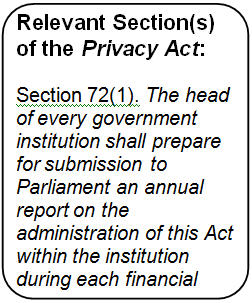
Strengthen the annual reporting requirements of government
departments and agencies under section 72 of the Privacy Act, by
requiring these institutions to report to Parliament on a broader spectrum of
privacy-related activities.
Background:
The Treasury Board Secretariat issued privacy reporting guidelines for government
institutions in April 2005, and updated these in February 2008.[8] The guidelines
buttress section 72 by requiring Deputy Heads to report comprehensively on a
wide range of management matters related to privacy promotion and protection
within federal institutions.
Rationale:
The Need for More Substantive Information
Our experience in reviewing section 72 reports over the years indicates that on the
whole they have rarely contained substantive information. As such their use to
Parliament, Canadians, and the OPC has been somewhat limited. Section 72
reports have tended to be a patchwork of statistics pertaining to the number of
requests received under the Privacy Act, the dispositions taken on
completed requests, the exemptions invoked or exclusions cited, and completion
times.
Integrating Into Law TBS Guidelines
The OPC is of the view that the Privacy Act should be amended by integrating
into the legislation requirements already provided for under the Treasury Board
guidelines. These guidelines are quite comprehensive, and among other things
require government institutions to provide:
-
a description of each PIA completed during the reporting period;
-
an indication of the number of new data matching and data sharing activities
undertaken;
-
a description of privacy-related education and training activities initiated;
-
a summary of significant changes to organizational structure, programs,
operations, or policies that may impact on privacy;
-
an overview of new and/or revised privacy related policies and procedures
implemented;
-
a description of major changes implemented as a result of concerns or issues
raised by the OPC or the Auditor General;
-
an indication of privacy complaints or investigations processed and a summary of
related key issues, and;
-
an indication of the number of applications or appeals submitted to the Federal
Court or Federal Court of Appeal on Privacy Act matters.
Benefits to Parliament, the OPC and Canadians
The Treasury Board guidelines would have added weight and authority if their
provisions were mandated by the Privacy Act. Parliamentary committees
would be better positioned to discharge their responsibilities to review the
personal information management practices of the federal government in the
broader context of reviewing departmental performance. A more comprehensive coverage
of privacy management issues would provide Parliamentarians with relevant
information to evaluate the extent to which government institutions are
addressing new and emerging privacy challenges, and whether programs or
initiatives being undertaken may pose a threat to the privacy rights of
citizens. Canadians too would be better informed on how their personal
information is being handled by government departments and agencies, and the
manner in which their information requests or complaints are being processed.
The OPC could better carry out its mandate, for the benefit of Parliament and
Canadians as a whole.


Introduction of a provision requiring an ongoing five year
Parliamentary review of the Privacy Act.
Background:
Currently, there is no mandatory periodic review of the Privacy Act to ensure its
ongoing evolution and adaptation to modern realities and challenges. By
contrast, section 29 of PIPEDA requires that the first part of that act
be reviewed every five years by the committee of the House of
Commons, or of both Houses of Parliament, that may be designated or established
by Parliament for that purpose. A number of provinces have a similar
requirement for regular legislative review of their public sector privacy law.
While a statutory review of the Privacy Act took place in 1987, the
recommendations in the report Open and Shut and in the testimony heard by the
Justice standing committee were never enacted.[9]
The OPC has repeatedly emphasized the need for informed public debate on
privacy laws whether they apply to the operations of government or to the
activities of the private sector. Discussion of privacy issues has been spotty
and targeted since the review in 1987, with a very limited consultation on
electronic commerce issues prior to PIPEDA implementation, and the sole Senate
committee hearings on the proposed privacy charter under Senator Sheila
Finestone in 1995-96.[10]
Rationale:
Harmonize the Data Protection Framework across
Jurisdictions in Canada
Harmonization between private sector and public sector laws at the federal level, and between
federal and provincial legislation, is a laudable goal for the privacy
protection regime in Canada wherever possible. Committing government officials
to a regular review of the legislation would greatly assist in that regard, as
developments at various levels of government could be more easily taken into
account.
Ensure the Privacy Act Keeps Pace with Rapidly
Evolving Technologies and International Trends
The Privacy Act serves as the information crux between Canadians and their
government; but as with previous reviews, there is a real risk of this
legislation fading into irrelevance as new programs, technologies and data
practices go unmonitored. A serious, sustained national discussion is now
needed to renew the Privacy Act for the networked, digital environment
that now exists in Canada. Cyberspace was the stuff of science fiction when
the Privacy Act came into force twenty-five years ago; today the
Internet and digital devices shape our identities, professional lives and
personal sphere in new ways every day.
In summary, the five-year review requirement would serve three ends. It would
help synchronize the Canadian data protection framework across jurisdictions;
keep the privacy practices of all organizations, both private and public
sector, on the minds of Canadian decision-makers and industry; and it would
ensure federal law keeps pace with rapidly evolving technologies and
international trends.

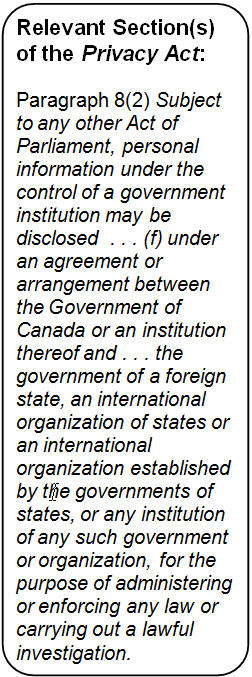
Strengthen the provisions governing the disclosure of personal
information by the Canadian government to foreign states.
Background:
Technological advances over the past two decades have made it much easier and cheaper for
governments to collect and retain personal information about their citizens.
At the same time, information sharing between nations has increased
dramatically as governments have adopted more coordinated approaches to
regulating the movement of goods and people and to combating transnational
crimes and international terrorism. In particular, enhanced information sharing has been a key strategy in improving
intelligence analysis since September 2001.
To cite a few examples: the Canadian Border Services Agency shares customs information and
information about travellers entering Canada; the Financial Transaction and
Reports Analysis Centre (“FINTRAC”) has over 40 agreements with other financial
intelligence units to shares information about individuals suspected of
engaging in money laundering or terrorist financing; Canada has negotiated Mutual
Legal Assistance Treaties (MLATs) with several countries; and law enforcement
and national security agencies regularly share information with international
counterparts.
However, the Privacy Act does not reflect this increase in international information sharing.
The Privacy Act places only two restrictions on disclosures to foreign
governments: an agreement or arrangement must exist; and the personal
information must be used for administering or enforcing a law or conducting an
investigation. The Privacy Act does not even require that the agreement
or arrangement be in writing. The Privacy Act does not
impose any duty on the disclosing institution to identify the precise purpose
for which the data will be disclosed and limit its subsequent use by the
foreign government to that purpose, limit the amount of personal information
disclosed and restrict further disclosure to third parties. Moreover, the Privacy
Act even fails to impose any basic obligations on the Canadian government
institution itself to adequately safeguard personal information.
As reported in the OPC’S 2002-2003 Annual Report, the Office conducted a
preliminary review of 21 information-sharing agreements between Canada and the US.
It concluded that only about one-third were reasonably well drafted. To mention
just two deficiencies: many of the agreements did not describe the personal
information to be shared or include a third party caveat; that is, a statement
indicating that the information received under the agreement will not be
disclosed to a third party without the prior written consent of the party that
provided the information.
Rationale:
Putting in Place Standards for the Sharing of Personal
Information
The consequences of sharing personal information without adequate controls
are clearly demonstrated in Justice O’Connor’s Report on the Factual Inquiry
with respect to the Commission of Inquiry into the Actions of Canadian Officials in
Relation to Maher Arar. Justice
O’Connor concluded that it was very likely that, in making the decisions to
detain and remove Mr. Arar to Syria, the U.S. authorities relied on inaccurate
information about Mr. Arar provided by the RCMP.
The lack of standards governing the sharing of personal
information by Canadian officials was also addressed in a January 2008 public
hearing as part of work currently being conducted by former Supreme Court of
Canada Justice Iacobucci, in the Internal
inquiry into the actions of Canadian officials in relation to Abdullah Almalki,
Ahmad Abou-Elmaati and Muayyed Nureddin.
Minimizing Risks to Canadians by Clearly Defining
Responsibilities
In order to minimize the risks to Canadians resulting from this
increased information sharing, the OPC believes that the Government of Canada
and Parliament should consider specific provisions to define the responsibilities
of those who transfer personal information to other jurisdictions and to
address the issue of the adequacy of protection in those jurisdictions.
Prescribing the Form and Content of Information-Sharing
Agreements
The Treasury Board Secretariat has developed guidelines setting out elements
that a written agreement or arrangement should
contain. These guidelines are a positive first step that should be formalized
either in legislation or by amending section 77 of
the Privacy Act to include a provision allowing the Governor-in-Council
to make regulations prescribing the form and content of information-sharing
agreements.
Limiting Disclosure of Personal information
In addition, paragraph 8(2)(f) should be amended to state that personal
information may only be disclosed where the information is required for the
purpose of administering or enforcing any law which has a reasonable and direct
connection to the original purpose for which the information was obtained.

A Chronology of Recommendations
Theme
|
Open and Shut: Enhancing the Right to Know and
the Right to Privacy
Report of the Standing Committee of Justice and Solicitor General on the
Review of the Access to Information Act and the Privacy Act (March
1987) |
The Steps Ahead:
Government Response to Open and Shut: Enhancing the Right to Know and the
Right to Privacy (1987) |
Government Accountability for Personal Information
- Reforming the Privacy Act (June 2006) |
Addendum to Government Accountability for Personal
Information: Reforming the Privacy Act (April 2008)
&
Opening Statement by Jennifer Stoddart, Privacy Commissioner of Canada on Privacy Act Reform (April 2008) |
1. Limiting Collection |
|
|
Amend Privacy Act to include a "necessity test" for the collection
of personal information.
Amend Privacy Act to strengthen notice requirements to individuals.
|
Amend Privacy Act to include a "necessity
test" for the collection of personal information. |
2. Expanding Court Review |
Simplify
rules of court to allow individuals to seek court review in as simple a
manner as possible and that Federal Court should award costs on
solicitor-client basis to a successful applicant.
Amendment to provide individuals with monetary damages for identifiable harm
resulting from unauthorized collection, improper disclosure and denial of
access.
|
No
direct response with respect to simplifying rules of court.
Creation of civil sanctions in Privacy Act not warranted at this time.
|
Amend
the Privacy Act to permit Court review of innapropriate collection,
use, disclosure of personal information.
Amend Act to give Court the power to award damages.
|
Amend the Privacy Act to permit Court review of
innapropriate collection, use, disclosure of personal information.
Amend Act to give Court the power to award damages.
|
3. Privacy Impact Assessments |
Privacy
Impact statement requirement for all legislation before Parliament with
privacy implications. |
Government
will not move to require that a PIA accompany each piece of legislation. |
Amend Privacy Act to require PIAs and public reporting on results of PIAs. |
Amend Privacy Act to require PIAs and
public reporting on results of PIAs. |
4. Research and Public Education Mandate |
Amend Privacy Act to include public education mandate for Treasury Board and
Privacy Commissioner.
Amend Privacy Act to enable Privacy Commissioner to undertake research
studies.
|
Government
will establish public awareness program.
Government will amend Privacy Act to include public education mandate
for Privacy Commissioner.
No direct response with respect to research mandate.
Government
recognized Privacy Commissioner should have public education mandate. |
Amend Privacy Act to give Privacy Commissioner research and education
mandate. |
Amend Privacy Act to give Privacy Commissioner
research and education mandate. |
5.
Communication with Public |
|
|
Amend
the Privacy Act to enable the Privacy Commissioner to disclose
information on the privacy management practices of government institutions
outside the Annual Reporting vehicle. |
Amend the Privacy Act to enable the Privacy
Commissioner to disclose information on the privacy management practices of
government institutions outside the Annual Reporting vehicle. |
6. Discretion in Dealing with Complaints |
|
|
Amend
the Privacy Act to give the Privacy Commissioner the discretion to
more efficiently and expeditiously deal with complaints which have less
systemic and societal significance. |
Amend the Privacy Act to give the Privacy
Commissioner the discretion to more efficiently and expeditiously deal with
complaints which have less systemic and societal significance. |
7. Definition of "Personal Information" |
Amend
definition of "personal information" to include personal data in
any form. |
Maintain
definition, monitor government surveillance and testing activities. |
Amend
definition of "personal information" to include unrecorded
information. |
Amend definition of "personal
information" to include unrecorded information. |
8. Annual Reporting Requirements |
Establish
hearings to review annual reports of institutions under section 72 of the Privacy
Act.
Amend section 72 of Privacy Act to require TBS to prepare a
Consolidated Annual Report on annual reports received from government
institutions. |
No
direct response.
Government will prepare the consolidated annual report for 1987-1988 fiscal
year. |
Amend
section 72 of the Privacy Act to strengthen annual reporting
requirements for government institutions. |
Amend section 72 of the Privacy Act to
strengthen annual reporting requirements for government institutions. |
9. Public Consultation/ Review of Act |
Amend
section 75(2) of the Privacy Act to provide for a second legislative
review four years after tabling of Open and Shut. |
Government
supports ongoing parliamentary oversight, however, Committee should set its
own agenda. |
Need
for broad based public consultation. |
Introduction of a provision in the Privacy Act requiring
an ongoing five-year parliamentary review of the Act. |
10. Transborder Data Flows |
No
Amendment to Privacy Act recommended, but Government should conduct a
review/study of TBDF. |
Government
agreed. |
Amend
paragraph 8(2)(f) of the Privacy Act to tighten control over
information sharing with foreign states.
Amend section 77 of the Privacy Act to add regulation making power
regarding information sharing agreements.
|
Amend paragraph 8(2)(f) of the Privacy Act to tighten control over information sharing with foreign states.
Amend section 77 of the Privacy Act to add regulation making power
regarding information sharing agreements.
|
|


























